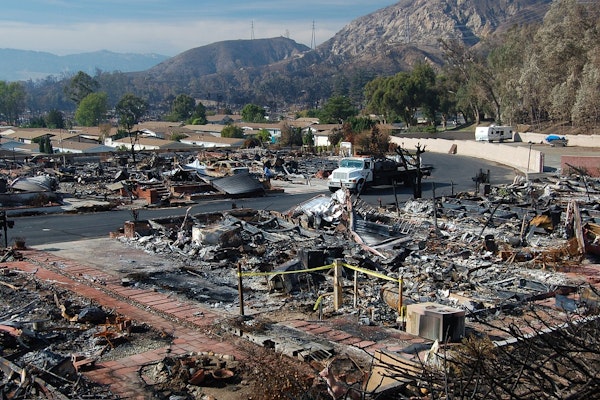
Florida’s Insurance Market Faces Shake-Up as Lawmakers Tackle Rising Costs
With soaring premiums and industry instability, Florida lawmakers are pushing for reforms in home and auto insurance. Transparency, incentives, and technology may offer relief, but challenges remain.
March 5
Auto
Legislation & Regulation
Property
Technology
Florida

Insurance Industry Grapples with Escalating Natural Disaster Risks
As extreme weather events grow in frequency and severity, insurers must adapt through innovation, risk modeling, and new risk transfer strategies to remain viable.
March 5
Catastrophe
Legislation & Regulation
Property
Risk Management
California

Georgia Court Rules in Favor of Injured Worker Despite Prior Medical Misrepresentation
A Georgia appellate court ruled that an employer cannot use a worker’s prior undisclosed injury against them if the employer knowingly continued their employment before a subsequent workplace injury occurred.
March 4
Legislation & Regulation
Litigation
Risk Management
Workers' Compensation
Georgia

Firefighter Indicted for Alleged Workers’ Compensation Fraud
An Ohio firefighter has been indicted on charges of workers’ compensation fraud and theft, accused of unlawfully obtaining benefits between January and February 2022.
March 4
Fraud
Insurance Industry
Litigation
Workers' Compensation
Ohio

Insurance Fraud Surges in Canada, Hitting Auto Repair Shops Hard
Fraud investigations in Canada jumped 76% in 2024, with auto-related scams making up 67% of cases. Staged crashes, AI-powered fraud, and stolen vehicle scams are straining repair shops.
March 4
Auto
Fraud
Insurance Industry
Risk Management

Florida Insurance Market Strengthens as Legal Reforms Curb Costs
Legislative reforms targeting legal system abuse and claim fraud are improving Florida’s insurance market, reducing litigation, attracting insurers, and slowing premium increases.
March 4
Insurance Industry
Legislation & Regulation
Litigation
Property
Florida

AI-Powered Fraud Is Reshaping Insurance—Are Insurers Keeping Up?
Artificial intelligence is revolutionizing fraud detection in insurance, but as fraudsters adopt AI-driven tactics, the industry faces an escalating arms race. Insurers that fail to invest in AI risk being outpaced by increasingly sophisticated fraud schemes.
March 3
Fraud
Insurance Industry
Litigation
Technology

Former New Orleans Officer and Nevada Attorney Accused in Insurance Fraud Scheme
A former police officer and current attorney is accused of orchestrating an insurance fraud scheme involving inflated art valuations and false police reports.
March 3
Fraud
Insurance Industry
Liability
Litigation
California
Louisiana
Nevada

Insurance Industry Trends and Challenges Through 2040
A global survey of over 500 insurance executives reveals how AI, climate risks, cybersecurity, and evolving market dynamics are shaping the industry’s future through 2040.
March 3
Insurance Industry
Risk Management
Technology

AI Analysis Reveals $2.15 Trillion in US Property at Risk from Wildfires
A new AI-driven study by ZestyAI finds that $2.15 trillion worth of U.S. residential property is at high risk of wildfire damage, affecting millions of homes beyond historically fire-prone regions.
February 27
Catastrophe
Insurance Industry
Property
Underwriting
California
Colorado
Kentucky
North Carolina
South Dakota

How AI and IoT Are Transforming Risk Management
AI, IoT, and blockchain are revolutionizing risk management by enabling insurers to predict and prevent losses, reducing costs and improving safety through real-time data analysis.
February 26
Catastrophe
Insurance Industry
Risk Management
Technology

Maine Stands Out as Home Insurance Rates Hold Steady Amid National Spikes
While home insurance premiums rise across the U.S., Maine has maintained stability, experiencing a rate decrease in 2024. Geography and low disaster risk contribute to its resilience.
February 25
Insurance Industry
Legislation & Regulation
Property
Risk Management
Maine
Massachusetts
New Hampshire
Vermont

Chegg Sues Google Over AI Overviews, Claims It Hurts Publishers and Students
Chegg, an online education company, has sued Google, alleging that its AI-generated search overviews undermine publishers by reducing traffic and profits, harming digital content creators.
February 25
Arkansas
California
District Of Columbia

California Lawsuit Targets Apple Over PFAS in Watch Bands
Two California residents filed a class action lawsuit against Apple, alleging the company misrepresented the health risks of PFAS chemicals used in its Apple Watch bands.
February 25
Insurance Industry
Legislation & Regulation
Litigation
Risk Management
California

Woman Sentenced for Insurance Fraud After Claim Photos Found Online
Rhonda Keisha Powell of Upper Marlboro, Maryland, has been sentenced to 45 days in jail for felony insurance fraud after investigators discovered that photos she submitted with her claim were easily found on the internet.
February 25
Fraud
Insurance Industry
Litigation
Risk Management
Maryland





